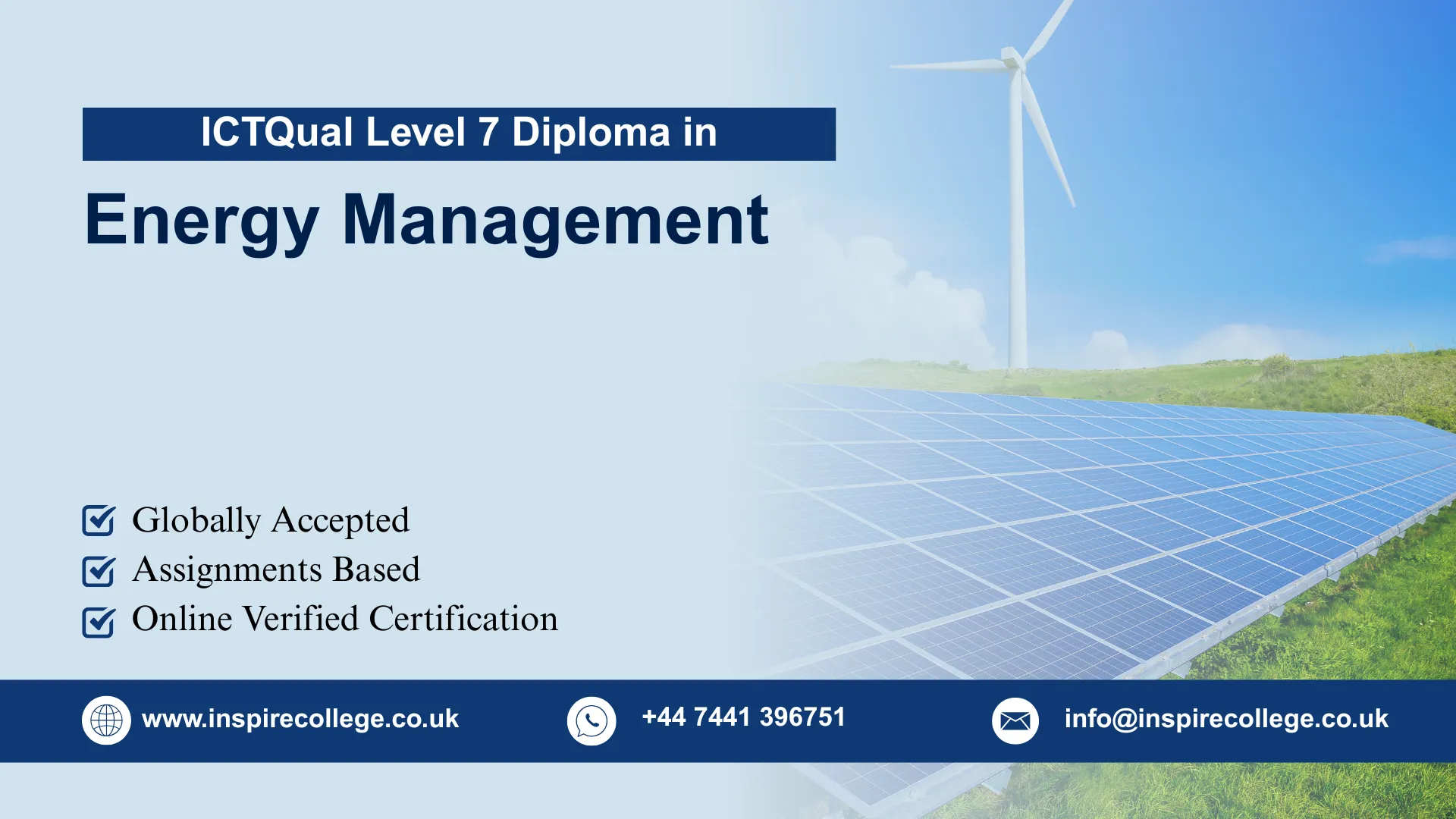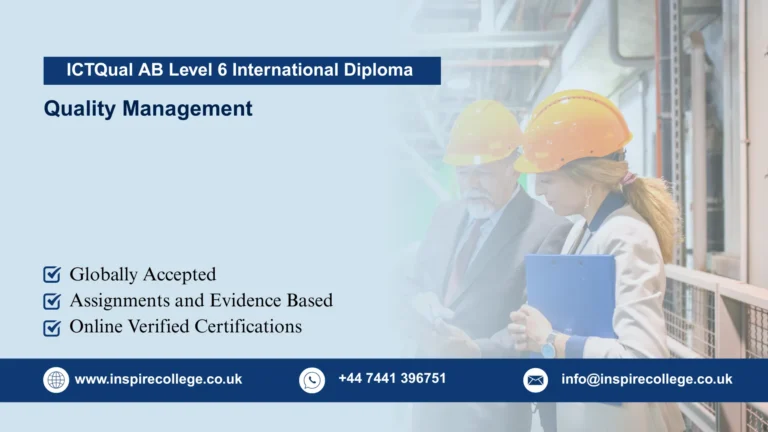
ICTQual Level 7 Diploma in Energy Management
In today’s rapidly evolving global economy, sustainability is more than a corporate responsibility—it is a strategic advantage. The ICTQual Level 7 Diploma in Energy Management is a prestigious qualification tailored for professionals seeking to deepen their expertise in sustainable energy practices and strategic energy management. This diploma provides a robust framework for developing the leadership skills required to drive organizational change in energy efficiency and environmental performance.
The ICTQual Level 7 Diploma in Energy Management is an advanced qualification designed for senior professionals, energy consultants, engineers, and sustainability managers. It equips learners with the knowledge and practical tools necessary to design and implement comprehensive energy management systems, aligned with international standards such as ISO 50001.
This qualification is comparable to a Master’s level credential and is ideal for individuals looking to specialize in strategic-level energy policy and implementation. It enhances the professional’s ability to influence corporate sustainability, regulatory compliance, and cost-effective energy use.
ICTQual is a recognized awarding body committed to delivering high-quality vocational qualifications that meet the needs of modern industries. Their Level 7 Diploma in Energy Management is crafted by industry experts and regularly updated to reflect emerging technologies and policy changes.
The ICTQual Level 7 Diploma in Energy Management is more than a qualification—it is a catalyst for career transformation and a stepping stone toward becoming a leader in the global movement toward energy sustainability. Whether you’re an experienced professional or looking to pivot into the energy sector, this diploma will provide the critical knowledge and credentials to drive meaningful environmental and financial impact.
To enrol in the ICTQual Level 7 Diploma in Energy Management, applicants are expected to meet the following criteria:
Minimum Age
- Applicants must be 21 years of age or older at the time of enrolment.
Educational Background
- A Level 6 qualification (such as a Bachelor’s degree or equivalent diploma) in a relevant field such as engineering, environmental science, energy management, or business.
- Alternatively, candidates with a non-related qualification but substantial relevant work experience may also be considered on a case-by-case basis.
Professional Experience
- A minimum of 2 years of relevant professional experience in energy management, environmental sustainability, engineering, facilities management, or a related sector is highly recommended.
- Candidates with significant managerial or technical experience in the energy or sustainability sectors will be given preference.
English Language Competency
- Proficiency in English is essential. Non-native speakers should have a minimum CEFR Level B2 or equivalent (e.g., IELTS 5.5 or above), ensuring the ability to engage with complex texts, write structured reports, and participate effectively in discussions and assessments.
Mandatory Units
The ICTQual Level 7 Diploma in Energy Management consists of 11 mandatory units required for completion.
Mandatory Units
- Introduction to energy management
- Technical and Operational
- Behavioural Change and Motivation
- Waste Management
- Transport
- Water
- Procurement
- Information & Communications Technology
- Energy Assessments, Measurements and Verification
- Regulatory & Legal Compliance and Carbon Management
- Strategy/Plan in energy management
Here are the learning outcomes for each study unit:
Introduction to Energy Management:
- Understand the fundamental concepts and principles of energy management.
- Identify the importance of energy conservation and efficiency in various industries and sectors.
- Explore different types of energy sources and their environmental impacts.
- Recognize the role of energy management in achieving sustainability goals within organizations.
Technical and Operational:
- Gain knowledge of energy systems, equipment, and technologies used in industry.
- Learn how to optimize energy performance through technical upgrades and operational improvements.
- Understand energy consumption patterns and identify opportunities for efficiency enhancements.
- Develop skills in implementing energy-saving measures and monitoring energy usage.
Behavioural Change and Motivation:
- Understand the psychological factors influencing energy consumption behaviors.
- Learn strategies for promoting energy-saving behaviors and motivating stakeholders.
- Explore techniques for fostering a culture of energy efficiency within organizations.
- Develop communication and engagement skills to encourage participation in energy conservation initiatives.
Waste Management:
- Learn about waste generation, handling, and disposal practices.
- Understand the environmental and economic impacts of waste production.
- Explore methods for reducing waste generation and improving waste management processes.
- Develop strategies for implementing waste reduction and recycling programs.
Transport:
- Understand the energy consumption patterns and environmental impacts of transportation.
- Learn about sustainable transportation options and alternative fuels.
- Explore strategies for reducing energy consumption and emissions in transportation systems.
- Develop skills in developing and implementing transportation management plans to optimize energy efficiency.
Water:
- Understand the importance of water conservation and efficiency.
- Learn about water management practices and technologies.
- Explore strategies for reducing water consumption and minimizing waste.
- Develop skills in implementing water-saving measures and monitoring water usage.
Procurement:
- Understand the role of procurement in energy management and sustainability.
- Learn about sustainable procurement practices and criteria for selecting energy-efficient products and services.
- Explore strategies for incorporating energy considerations into procurement decisions.
- Develop skills in evaluating suppliers and negotiating contracts to optimize energy performance.
Information & Communications Technology:
- Gain knowledge of energy usage patterns and opportunities for efficiency improvements in ICT systems.
- Learn about energy-efficient ICT technologies and strategies.
- Explore methods for reducing energy consumption in data centers, networks, and other ICT infrastructure.
- Develop skills in implementing energy-saving measures and optimizing energy usage in ICT environments.
Energy Assessments, Measurements, and Verification:
- Acquire proficiency in conducting energy audits and assessments to identify energy-saving opportunities.
- Learn methods for accurate measurement and verification of energy performance improvements.
- Understand the importance of data analysis and interpretation in evaluating energy usage.
- Develop skills in compiling energy reports and verifying energy-saving claims.
Regulatory & Legal Compliance and Carbon Management:
- Understand the regulatory framework governing energy management and environmental compliance.
- Learn about carbon management strategies and emissions reduction techniques.
- Gain knowledge of relevant environmental laws, regulations, and reporting requirements.
- Develop strategies for ensuring compliance with energy and carbon regulations.
Strategy/Plan in Energy Management:
- Develop comprehensive energy management strategies and plans tailored to organizational needs and objectives.
- Learn how to set achievable goals and targets for energy efficiency and sustainability.
- Understand the importance of stakeholder engagement and collaboration in energy management planning.
- Develop skills in resource allocation, budgeting, and project management for energy initiatives.
The ICTQual Level 7 Diploma in Energy Management is specifically designed for experienced professionals and aspiring leaders who are involved in energy, sustainability, or environmental management at a strategic level. This course is ideal for individuals who are responsible for implementing and overseeing energy policies, reducing carbon emissions, and driving sustainability initiatives across organizations.
This qualification is a perfect fit for:
- Energy Managers and Coordinators looking to advance to senior strategic roles
- Sustainability and Environmental Consultants who want to broaden their expertise in energy systems
- Facilities and Operations Managers responsible for energy performance and cost control
- Engineers and Technical Professionals aiming to specialize in energy efficiency and low-carbon technologies
- Policy Advisors and ESG Professionals who influence or design corporate energy strategies
- Corporate Leaders and Directors seeking to align their business with global sustainability standards such as ISO 50001 and Net-Zero targets
- Graduates or professionals with a Level 6 qualification (or equivalent experience) in engineering, environmental science, energy, or a related field
Whether you’re managing a large facility, consulting for green projects, or shaping corporate energy policies, this diploma will give you the advanced knowledge and leadership skills to make a measurable impact in a fast-evolving energy landscape.
Register Now
FAQs for ICTQual Level 7 Diploma in Energy Management






